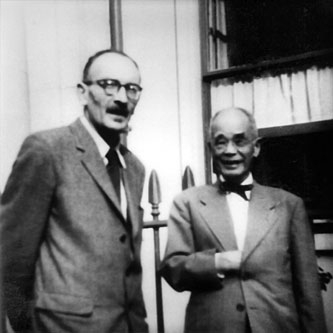
THE EASTERN BUDDHIST - NEW SERIES II/1 1967 -
IN MEMORIAM DAISETZ TEITARO SUZUKI 1870-1966
Edward Conze:
A Personal Tribute
... In 1937, at the age of 33, the bottom had fallen out of what I
then thought was my world. My political faith had collapsed under
the impact of Stalinism and of what I had observed in Spain, my
marriage had failed, my job seemed distinctly bleak, I had even
started to consult psychonanalysts, and there seemed nothing left that
I could live for. Then one day I happened to look into the window
of one of the bookshops opposite the British Museum, my curiosity
was aroused and just on chance I bought the third volume of Essays
in Zen Buddhism. For weeks thereafter I retired each day into
Hampstead Heath, devoured each page of the book again and again,
and rapidly acquired all of Suzuki's other works one by one.
What had happened was that D. T. Suzuki had revivified an
earlier interest in Buddhism. It had begun with a reading of the
Tauchnitz edition of Lafcadio Hearn's Gleanings in Buddha-
Fields when I was 13. It was renewed again through contact with
Buddhist scholars when, at the age of 21, I was a student in Heidel-
berg. It is noteworthy that I have always been much more attracted
by Suzuki's exposition of the practicalities of Zen. This is pro-
bably due to my German origin and background, for most non-Asian
scholars working on Prajñāpāramitā have so far been Germans. To [85]
me it is a measure of the greatness of the man that Suzuki should
have made the Mahayana equally palatable to two such divergent
national mentalities as the German and the Anglo-Saxon. Because,
since the Buddha himself was neither a German nor an Englishman,
it may well be that both the metaphysical and the practical interpre-
tation are equally near to His original doctrine.
Under the impulse of D. T. Suzuki's message I then withdrew
into a private wood belonging to a Quaker friend of mine in the New
Forest, and practised as much meditation as can be practised in this
evil age. Then I emerged again, went to Oxford, and published a
number of books in which I have tried to transmit the understanding
of the Mahayana, and particularly of the Prajñāpāramitā, which
D. T. Suzuki had first conveyed to me. His assurance, once by word
of mouth and once by letter, to the effect that he thought that I had
actually understood Buddhism, has given me great happiness and
encouragement. For me therefore Daisetz Teitaro Suzuki will always
remain a charismatic figure who raised me from a living death and
has enabled me to lead a meaningful life for nearly three decades.
And what he has done for me, that he has done for many others
also.

Edward Conze
Buddhist Scriptures
... I must single out Daisetz Teitaro Suzuki, because to him I
owe a debt of gratitude which can never be repaired. When, like
others before me, in the middle of my journey through life I had
strayed away from the right road, it was he who re-opened my eyes
to the splendour of the Budhha's message. Whatever is good in this
book is Suzuki's. The rest is my own.
Edward Conze
London, June 1957